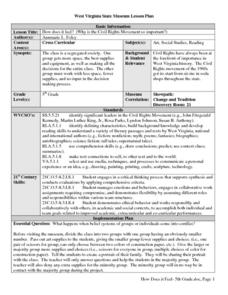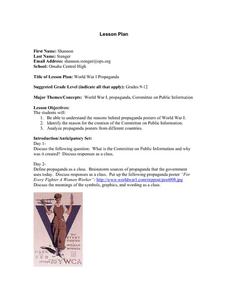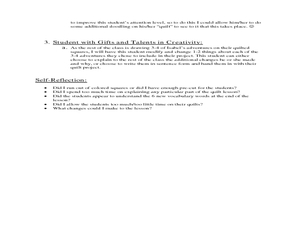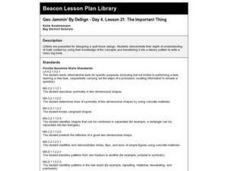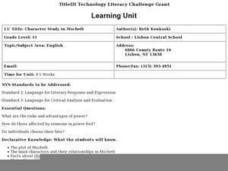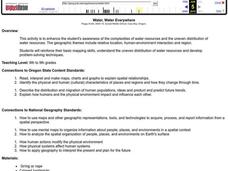Curated OER
How does it feel? Why is the Civil Rights Movement so Important?
Fifth graders study the Civil War. In this US history lesson, 5th graders simulate what life was like during the Civil War by having two groups with one group given more materials than the other group. Students then draw a portrait of...
Curated OER
Preparing the Soil
Students explore philanthropy through literature. In this service learning lesson plan, students consider character traits as they read Seedfolks. Students record their notes regarding the characters in the story of a community garden in...
Curated OER
Fact or Fantasy Writing
First graders see that some written text is for pleasure and enjoyment while some is for relaying information. They get to experience both types during the lesson. They brainstorm ideas for a story about a new kid in school to write about.
Curated OER
Canada Arrives in a Splash of Color
Students investigate social and political issues surrounding founding of Canada and compare their relevance to Canada today, interpret art works representing Canada's past identity and compare that identity to how Canada is perceived...
Curated OER
What Can We Lose? What Do We Lose as we Gain Force With A Lever?
Third graders view a demonstration of a teeter totter as a basis for assessing pre-knowledge of a lever. They create a KwL chart. Students work in small groups to conduct a variety of experiments. The first requires students to tie books...
Curated OER
Story Parts
Third graders identify the three major parts of a story. After reading the book "Stellaluna," students discuss the beginning, middle and end of the story. They write a short story depicting the events that would happen if the story...
Curated OER
The Cycle of Life
Eighth graders search for rites of passage in their own lives and study rites of other cultural groups in Louisiana and around the world. They assess how to recognize moments of importance in people's lives and find meaning in the stages...
Curated OER
History Close to Home
Students examine primary sources as related to Nevada and the Civil War. In this United States history lesson, students gather and analyze various primary sources in small groups and interpret unknown vocabulary words by using context...
Curated OER
World War I Propaganda
Students interpret historical evidence presented in primary and secondary resources. In this World War I lesson, students examine the propaganda techniques used by different nations during the war and analyze examples. Students also...
Curated OER
Patchwork Adventure Poetry
Third graders explore poetry by completing a worksheet. In this poetry instructional activity, 3rd graders create a quilt using images students have drawn based on imagery. Students practice using vocabulary from the poem "Adventures...
Curated OER
PBS Kids Go Buster Buffalo Round-Up
Second graders visit Rapid City, South Dakota, and Jackson Hole, Wyoming in these two episodes of Buster. They examine the Lakota people in South Dakota to see what it means to persevere. They sing songs and study idioms. They brainstorm...
Curated OER
Bernardo de G??lvez: Supporter of the American Revolution
Eighth graders explore the assistance to the American Revolution provided by Spain. Through class discussion and research, they gather information about Bernardo de Galvez and his role during the Revolutionary War. Students synthesize...
Curated OER
Creative Writing Inspired by Paintings
Third graders view a PowerPoint presentation of the images by Maxfield Parrish. They wirte a short story based on one image and create drawings of an imagined character.
Curated OER
Severe Weather Planning
Fourth graders research the need to prepared for a severe weather event. They select one type of weather condition and explain how to be prepared in a report.
Curated OER
Weather Myths
Fourth graders examine myths that are based on weather phenomenon. They write, illustrate and present an original weather myth.
Curated OER
Animal Book
Students explore habitats and the needs of living things. They research a selected animal. Students use KidPix and create a variety of animal riddles. They combine their riddles with those of classmates to create their animal books.
Curated OER
Geo Jammin By Design: The Important Thing
Students brainstorm what they know about geometric terms and patterns. They identify symmetry, shapes and congruency. They create a book of symmetry.
Curated OER
Character Study in Macbeth
Eleventh graders analyze a Shakespeare soliloquy by writing a prose summary of it. They keep a character journal, following one character through the play and analyzing what the character does and says, as well as, might have done or...
Curated OER
Hurricane Scavenger Hunt
Fourth graders use Internet and/or library resources to locate and record information about hurricanes on a worksheet..
Curated OER
Moving Pictures
Pupils review various pieces of artwork to determine the location and weather of the location portrayed. Using a Harris painting, they identify the sources of power and discuss solutions for using modern technology to solve any issues. ...
Curated OER
Water, Water Everywhere
Students are introduced to the complex issues of water resources around the globe. In groups, they take on the role of a country and map out the location of water sources. They barter, sell or take over other groups to have access to...
Curated OER
Same, But Different
Young scholars compare and contrast specific characters in the book, "Old Henry." They discuss similarities and differences between people and define character traits. They assess one's own character traits and have a class discussion...
Curated OER
Reporting Live From...
Young scholars examine the many disasters in West Virginia. In this US history lesson, students write about and give an oral presentation of one of the disasters as if they were reporters.
Quizlet
Quizlet: Prediction and Inference Terms Test
A test with five matching questions and 4 multiple choice questions over the following literary terms: prediction, inference, suspense, foreshadowing, character, character traits, motivation, denotation, and connotation.


